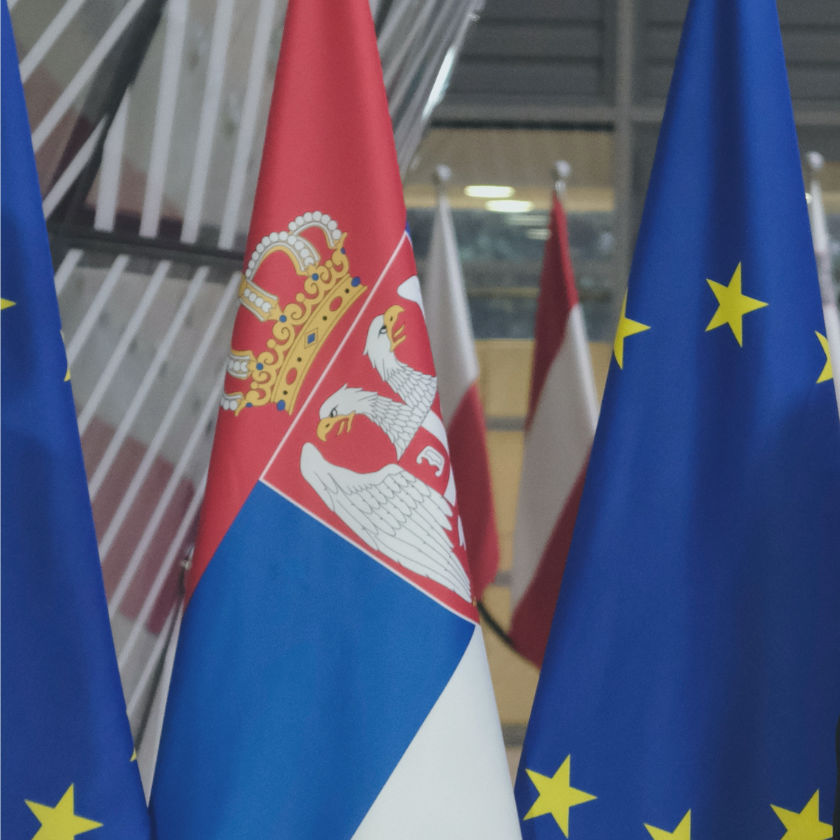Balkans
The Western Balkans include Croatia, Bosnia-Herzegovina, Kosovo, Northern Macedonia, Montenegro, Serbia and Albania. This area continues to be marked by the consequences of the wars of the 1990s.

European Strategic Autonomy and the Green Transition: What Industrial and Technological Strategies? (Replay)
The invasion of Ukraine by the Russian Federation and consequent supply chain disruptions in the energy sector have exposed critical vulnerabilities in the European Union’s broader strategic autonomy agenda and bolstered efforts at lessening strategic dependency on third states in a variety of areas , from raw materials, batteries and active pharmaceutical ingredients to hydrogen, semiconductors, and cloud and edge technologies.
Neutrality and non-alignment after the Russian Invasion of Ukraine
The Russian invasion of Ukraine has reignited discussions about the status of neutrality and non-alignment in several parts of Europe.
Trade, Investments, Technology, Climate Change, Human Rights: How should the EU Deal with China?
Ifri, the Austro-French Centre for Rapprochement in Europe and Konrad Adenauer Foundation Multilateral Dialogue organized a videoconference called "Trade, Investments, Technology, Climate Change, Human Rights: How should the EU Deal with China? " on October 27, 2020.
Budget Dramaturgy
The debate on the financial perspectives of the European Union (EU) is traditionally part of a complex dramaturgy, which borders on the cacophony: the proponents of more European solidarity oppose supporters of a fair return, defenders of traditional sectoral policies confront the promoters of expenses intended to prepare for the future, new member states are pitted against the old ones and the North against the South.
European Union-Western Balkans: Lost Illusions?
The “European prospects” of Balkan countries have evolved little since 2003.
French Engagement in the Western Balkans: Boosting Strategic, Political, Economic, and Societal Cooperation
After years of lower interest, France has signaled its ambition to re-engage in the Western Balkans. It is not starting from scratch. Historical affinities with the countries of the region abound, in culture, sciences, politics, and economy.
The European Union: Caught Between the United States and China
The United States and the European Union (EU) are now both in agreement regarding China – long viewed benevolently – as a systemic rival in the international order.
In search of a common spirit: the countries of the Weimar Triangle in the Covid-19 crisis
The coronavirus crisis has affected the countries of the Weimar Triangle to varying degrees. Bilateral relations between Germany and Poland as well as Germany and France have been strongly influenced by border closures, which have led to tensions between the countries.

The ICTY Story: A Clear Failure?
Established to hold trials for crimes committed during the Yugoslav wars in the 1990s, the International Criminal Tribunal for the former Yugoslavia (ICTY) has vacillated between its punitive purpose and writing the history of this period.

The Western Balkans and the Failure of European Enlargement
The process of European enlargement has been officially suspended for five years. Yet in the western Balkans it is rapprochement with Europe that publicly underpins the majority of political policy.
The European Union: Caught Between the United States and China
The United States and the European Union (EU) are now both in agreement regarding China – long viewed benevolently – as a systemic rival in the international order.
The Governance of Energy Poverty in Southeastern Europe
This report presents the outcomes of a recently-completed research project1 aimed at uncovering the different ways in which energy poverty – understood as a condition wherein the domestic energy services available to a household are below socially and materially necessitated levels – is produced by, and mitigated through, the interaction of relevant decision-making institutions in the energy, social welfare, health and housing domains. The project focused on conditions in Southeastern Europe, where energy prices have been recently on the rise despite falling incomes and poor access to efficient and adequate energy services.
Serbia moving ahead towards trade liberalization with EU?
An Interim Agreement on Trade and Trade related aspects (ITA), signed between the European Community and Serbia in April 2008, entered into force on February 1, 2010. This ITA, as a part of the Stabilization and Association Agreement, “establishes a bilateral free trade area over a period lasting a maximum of six years starting from the entry into force of this Agreement in accordance with the provisions of this Agreement and in conformity with those of the GATT 1994 and the WTO”.
Neutrality and non-alignment after the Russian Invasion of Ukraine
The Russian invasion of Ukraine has reignited discussions about the status of neutrality and non-alignment in several parts of Europe.
Trade, Investments, Technology, Climate Change, Human Rights: How should the EU Deal with China?
Ifri, the Austro-French Centre for Rapprochement in Europe and Konrad Adenauer Foundation Multilateral Dialogue organized a videoconference called "Trade, Investments, Technology, Climate Change, Human Rights: How should the EU Deal with China? " on October 27, 2020.
Support independent French research
Ifri, a foundation recognized as being of public utility, relies largely on private donors – companies and individuals – to guarantee its sustainability and intellectual independence. Through their funding, donors help maintain the Institute's position among the world's leading think tanks. By benefiting from an internationally recognized network and expertise, donors refine their understanding of geopolitical risk and its consequences on global politics and the economy. In 2024, Ifri will support more than 70 French and foreign companies and organizations.

















